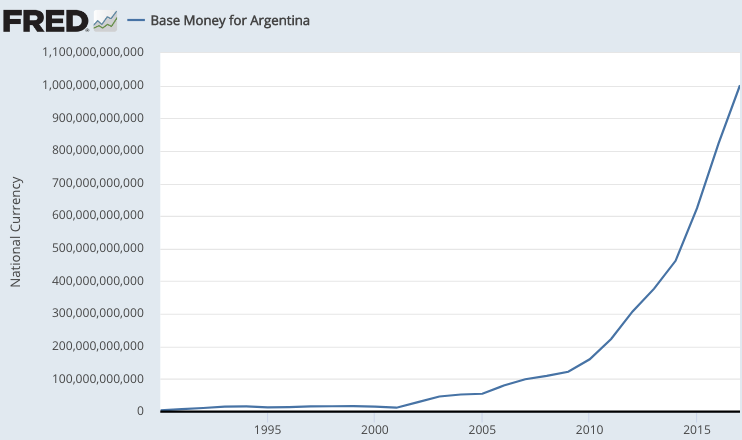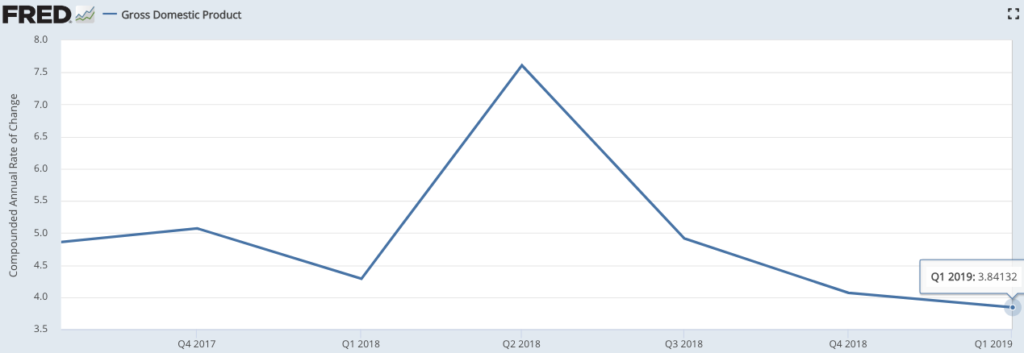What should we make of current market signals?
For those foolish enough to pay attention to my predictions, here are a few thoughts on the current condition of the economy. First the data:
1. Stocks hitting all-time record levels.
2. The yield curve un-inverting, back to a normal slope.
3. But 2-year yields remain below 3-month yields.
4. Five-year TIPS spreads at 1.87% (implying PCE inflation closer to 1.62%.)
The TIPS spreads might be slightly biased by risk premia, etc., but overall I suspect that inflation expectations actually are below 2%, say in the 1.7% to 1.8% range, over the next 5 years.
The most interesting data point is:
5. A roughly 88% chance of a rate cut by January 2020, according to the fed funds futures.
Update: That seems to be an error on my part. CME Fedwatch lists a 70.7% chance of a rate cut.
Here I think it’s important not to obsess over a single data point, but look at the set of data as a picture that describes a complex scenario. Here’s my view:
The stock market clearly doesn’t expect a recession. That’s probably the least controversial thing I’ll say. Thus the strong expectation of a rate cut by 2020 is motivated by something other than recession fears. (At least I got that right back in December!) My best guess is that the fed funds futures market and the TIPS markets are seeing the same thing—“lowflation” is a real issue, under-appreciated by the Fed.
Now let’s go back to stocks—why isn’t lowflation a problem for stocks? Let’s start with the fact that while academic economists like me worry about the impact of lowflation on policy credibility, it doesn’t matter all that much to hard-headed investors, who don’t much care whether inflation averages 1.75% or 2.0%, as long as it’s associated with steady NGDP growth.
Then recall that most recent recessions were triggered by tight money policies aimed at restraining high inflation. And yes, that includes the 2008 recession. The markets now see the Fed in a long drawn out battle against lowflation, which means that we’ll likely go many years before the Fed would institute the sort of tight money policy that typically triggers a recession.
In other words, they see a sort of goldilocks economy, with the Fed consistently trying to nudge PCE inflation up from 1.75% to 2.0%. They see the rate cut that they anticipate in 2020 as being analogous to the 1995 rate cut, which paved the way for 5 golden years of growth.
Of course the markets may be wrong, but that’s my best guess as to what they anticipate. And since I’m a market monetarist, that’s also what I anticipate.
There are worse things than 5 more years of the Fed struggling to push inflation up from 1.75% to 2%, and I’ve lived through plenty of them. Cast your eyes over to Europe, described in this memorable line by Wolfgang Munchau:
It says a lot about the eurozone economy that it reached the top of its business cycle with short-term interest rate at -0.4 per cent.
File that under “very good sentences”.
To add insult to injury, the Fed is having a June conference aimed at improving its already fine performance, whereas the Europeans don’t seem to have a clue as to what went wrong with the euro. Sad!
PS. Hint: The problem with the euro is not the lack of a eurozone-wide fiscal policy, which would never work, it’s the failure of the ECB to maintain adequate growth in NGDP. In other words, the stubborn Germans and the enlightened European liberals are both wrong. I’m afraid there’s no hope for Europe.
PPS. I have a new 7-page policy brief at Mercatus that explains the basics of monetary policy. It’s basically for beginners.



